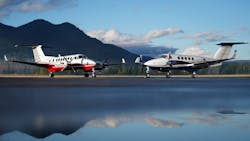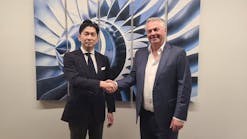Tamarack To Add Performance SMARTWING Prototype to King Air 350
The King Air 350 being flight tested across the U.S. joins the King Air 200 modification on its evaluation journey. Both feature Tamarack-patented load alleviation capabilities identified as the most dramatic sustainable technology available today in aviation.
Military and civilian customers alike are showing interest in Tamarack’s latest King Air modification. Tamarack’s King Air 350 Performance SMARTWING prototype joins the King Air 200, which has already been modified on a national performance evaluation tour. Both airframes are the military versions of the patented sustainability supporting Tamarack Active Winglet load alleviation technology.
The King Air 350 is in the initial flight evaluation phase to gather baseline data that will be compared to the predicted increased capabilities of the aircraft once the Performance SMARTWING modification is installed. The military market survey showcasing the King Air 200 indicated strong interest for a King Air 350, so Tamarack is responding to customer demand to create both models, which are expected to be available for purchase after certification within the next two years or sooner. The larger 350 model is very common in the defense community and the benefits of increased endurance and payload, high/hot take-off abilities, extended loiter time and safer, more stable flight are in high demand.
The Tamarack Performance SMARTWING on the King Air 350 marks the second turboprop airframe modification produced by Tamarack in addition to the nearly 150 Cessna Citation Jets currently modified with Tamarack’s Active Winglet technology. The Cessna fleet exhibits up to 33% fuel savings with this sustainable aftermarket technology, plus various performance benefits also featured on the Performance SMARTWING.
Tamarack president Jacob Klinginsmith said, “As our technology becomes more widely accepted, the Performance SMARTWING modifications will be a major contributor for reducing aviation’s carbon footprint and for reducing noise pollution. The modified aircraft need shorter runways and climb faster to higher altitudes, where other unmodified similar aircraft can’t get off the ground in high/hot conditions. That faster climb rate can literally be a life safer when escaping enemy fire in a military theatre.”
Tamarack is holding its Performance SMARTWING King Air 200 tests in partnership with Dynamic Aviation, an aviation solution provider for the Department of Defense and commercial aviation. Dynamic also operates the largest privately owned fleet of King Airs in the world.
Tamarack’s King Air 350 announcement comes on the heels of last month’s news about Tamarack joining the growing list of excellent aerospace companies chosen by the International Aircraft Dealers Association (IADA) to join its list of thoroughly vetted Verified Products and Services members. These members adhere to the highest standards of ethical behavior and skilled aviation expertise. Tamarack has received several other honors in recent months. Tamarack, for example, participated in the International Civil Aviation Organization (ICAO) Pre-Stocktaking Sustainability webinar, where Tamarack Klinginsmith was selected to represent current and upcoming technologies that aid in reducing fossil fuel usage and noise. Tamarack’s founder and CEO Nick Guida also provided detailed testimony to the U.S. Congress this year.
“Implementing new Tamarack sustainable technologies like the Performance SMARTWING into different aviation sectors is a positive step toward sustainability efforts,” says Klinginsmith. He added, “Tamarack’s announcement of the new Performance SMARTWING is additionally significant for the larger aviation industry, demonstrating the interest of military, commercial, and business sectors for the mission benefits and sustainability support provided by Active Winglet and Performance SMARTWING carbon footprint reducing technology. This is crucial to meet the aviation industry’s goal of carbon neutrality by 2050. The goal holds promise through the development of sustainable technologies like the Performance SMARTWING used in tandem with other sustainable options, such as Sustainable Aviation Fuels (SAFs).”


